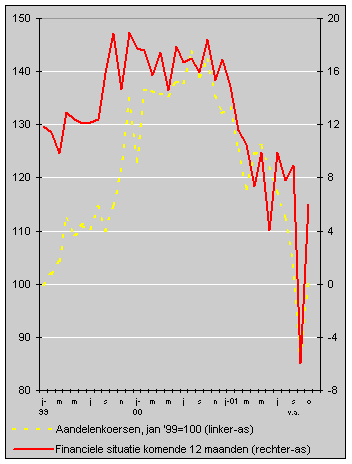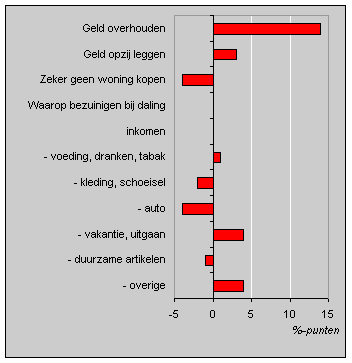Consumers economise on food, holidays and going out if need be

The volume increase of household consumption was much smaller in the first half of this year than in recent years. While job growth and the availability of extra financing options pushed up consumer spending substantially in the last few years, the growth in consumption fell back to 1.6% in the first six months of this year.
Consumers’ willingness to buy
It is difficult to judge how the present trend will continue. One indicator for this is the willingness to buy index Willingness to buy had been fairly stable in the course of this year - albeit at a lower level than last year – until the terrorist attacks in the US. The extra survey held immediately after the attacks showed a sharp drop in willingness to buy. In October it recovered again.
Opinion on financial situation and share prices

The extremely negative opinions on consumers’ own financial situation in the coming twelve months in particular were the cause of the remarkable fall in their willingness to buy in the extra September survey. Such pessimistic opinions had not been observed in earlier periods of crisis. One reason may be that households take the development of share prices into account more than they used to when judging their own financial situation. Falling share prices coincide to a large extent with a more negative consumer opinion on their own future financial situation, a trend that runs in parallel with the changing significance of shares in household capital. This increased from one quarter in 1995 to one third in 2000. The events in New York prompted a twenty percent fall in share prices in Amsterdam the next day. At the time of the survey in October, share prices had bounced back to the level of before 11 September.
Consumer opinions

Economies ‘if need be’
However, if their own financial situation deteriorates, consumers will make different economies than in 1993, when economic growth also fell sharply in a short space of time.
More households are in a position of save an amount of money monthly in 2001 than in 1993. The number of households who are certain they do not want to buy a house in the next two years is lower than in 1993. In 2001 more households than in 1993 will economise on food, holidays and going out if they have to make do with less income. Fewer households plan to economise on cars, clothes and shoes and other durable goods.
Frans van Ingen Schenau